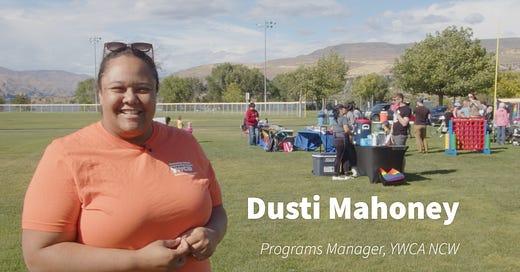Why Celebrate Juneteenth in North Central Washington?
Galveston, Texas is more than 2000 miles away and central Washington doesn't have a large black population, so why celebrate Juneteenth in rural Washington?
Juneteenth is sometimes described as “the US’s second Independence Day,” and the YWCA NCW organized a celebration of the holiday on June 19 at Walla Walla Point Park in Wenatchee.
“Juneteenth is the celebration of the last group of slaves in Galveston, Texas learning about the Emancipation Proclamation and being freed from chattel slavery,” said Dusti Mahoney, Programs Manager for the YWCA NCW.
Mahoney said that while North Central Washington has a small black community, it’s still important to center black voices and black experiences as much as possible.
What was a holiday traditionally celebrated by black communities since the end of the Civil War was declared an official Federal holiday just two years ago, and she said a lot of folks have the day off for maybe the first or second time ever. So it’s a great opportunity to organize a community event that allows folks to gather, have fun and remember the importance of the day.
“I think it’s important to really talk about why we have today off,” she said. “And what that means not only to the black community but also to kind of the greater American community as a whole.”
You can watch a video I put together from the event here.
My Two Cents
While the black community in the region is relatively small, that doesn’t make black experiences or black history any less relevant to our lives. Juneteenth marks the day when our country finally made good on the promise of freedom originally intended for all Americans.
Slavery, how long it lasted, and the unique brutality of the American chattel system, is our national shame. It is a stain on the reputation of this country that cannot be erased. The fact that it took three entire years since Lincoln’s famous proclamation freeing the slaves for the last slaves in Texas to actually be emancipated is also a stain on our legacy as a “land of freedom.”
I believe it’s important to look at American history with dispassionate sobriety, always avoiding the irrationality of nostalgia and nationalism. But that doesn’t mean only seeing the bad. We should also acknowledge and celebrate the good. We did end slavery. The sacrifices made to do that were monumental, but it was ended and it didn’t move West as more states entered the union as was feared by those of Lincoln’s generation.
But the legacy of slavery still affects us today, even in small towns that don’t have large black populations.
What proves that more than my recent story for Crosscut about Felix Dotson and what he has faced in Cashmere? The fact the Confederate flag has reportedly been a part of Cashmere’s senior parade also speaks to the allure of a failed state built on the subjugation of a race of people for profit in perpetuity.
Why the Confederacy is so attractive to some folks is beyond me. There are entire books written by much smarter people than me about the psychology of white supremacy so I won’t pontificate on the subject, but it is clear that the legacy of the Confederacy and its enduring attraction to some affects us to this day. The Confederate flag was prominently featured in Charlottesville and during the Jan. 6 attack on the Capitol.
That is one of the reasons why it’s so important to acknowledge and celebrate Black history and center Black experiences and voices. Black history is American history.
And if folks in the media are going to focus on stories that spotlight racism, we should also endeavor to highlight opportunities for folks to learn more about the Black American experience.
I noticed that my Crosscut piece got covered by every Central Washington media outlet (except for NCWlife – no surprise there). Yet apart from Gabe Garcia with the Wenatchee World, no other members of the local media establishment showed up to cover this Juneteenth event.
I’ve said it before and I’ll say it again: what media outlets choose not to cover often speaks volumes about their bias.





Takes for being here with your family, Dominick, and for covering our new holiday.